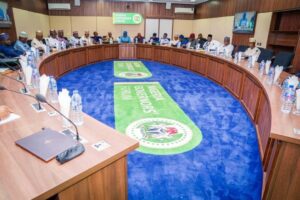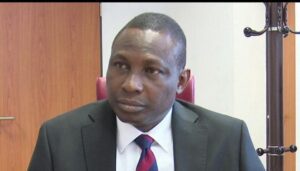
Minimum wage: Will Tinubu’s tripartite committee proffer a lasting solution?
The year 2023 was a truly unpleasant moment as it was dominated by the removal of fuel subsidies, higher inflation that affected real disposable incomes and devaluation of the naira, hike in transportation among others.
To be specific, the removal of subsidies on petroleum products further worsened the challenges faced by working people. It unleashed severe pain and contributed to galloping inflation even as it increased inequality and poverty.
Besides, the sharp and continuous rise in food prices owing to a combination of factors like the weakening naira, climate change, recent economic reforms and escalating insecurity that has led to food production shortfall.
According to the most recent National Bureau of Statistics (NBS) Consumer Price Index (CPI) report, the constant surge accelerated headline inflation to 28.2 percent in November 2023 and food inflation to 32.8 percent.
Similarly, the World Bank, in its latest Nigeria Development Update report, said sluggish growth and accelerating inflation in Africa’s biggest economy raised the poverty rate by 46 percent in 2023 from 40 per cent in 2018, with the number of poor Nigerians put at 104 million.
The global bank also said the country’s inflation eroded the N30,000 minimum wage by 55 percent, thus reducing household expenditure.
Just yesterday the federal government inaugurated a 37-man tripartite committee on national minimum wage with a mandate to recommend a new wage for the country.
The committee was inaugurated at the Council Chamber of the Presidential Villa in Abuja sequel to the approval by President Bola Ahmed Tinubu.
The committee, to be chaired by a former Head of Civil Service of the Federation, Alhaji Bukar Goni Aji, has membership across federal and state governments, private sector employers and the organised labour.
Representatives of the federal government are the Head of Civil Service of the Federation, Dr Folashade Yemi-Esan, Minister of Finance and Coordinating Minister of the Economy Wale Edun, Minister of Budget and Economic Planning Atiku Bagudu, and Minister of State for Labour and Employment Nkeiruka Onyejeocha (representing the Minister of Labour and Employment).
Others include the Permanent Secretary (General Services Office) in the Office of the Secretary to the Government of the Federation, while the chairman of the National Salaries, Income and Wages Commission (NSIWC), Mr Ekpo Nta, would serve as the secretary.
Representatives of state governments are Governor Mohammed Umar Bago of Niger state (North-Central), Governor Bala Mohammed of Bauchi state (North-East), Governor Umar Dikko Radda of Katsina state (North-West), Governor Charles Soludo Anambra state (South-East), Governor Ademola Adeleke of Osun state (South-West), and Governor Otu Bassey Edet of Cross River state (South-South).
Representatives of the Nigeria Employers’ Consultative Association (NECA) are the Director-General, Mr Adewale-Smatt Oyerinde, Chuma Nwankwo and Mr Thompson Akpabio, while the Nigeria Association of Chambers of Commerce, Industry, Mines and Agriculture (NACCIMA), will be represented by its national president, Asiwaju Michael Olawale-Cole, National Vice President, Mr Ahmed Rabiu, and National Life President Chief Humphrey Ngonadi.
The National Association of Small and Medium Enterprises (NASME) is represented by the President and Chairman of the Council, Dr Abdulrashid Yerima, Hon Theophilius Nnorom Okwuchukwu (private sector representative), and Zonal Vice President (North/West) Dr Muhammed Nura Bello.
The Manufacturers Association of Nigeria (MAN) is represented by its Director-General, Segun Ajayi-Kadir, the Human Resource Director of Nigerian Breweries, Mrs. Grace Omo-Lamai, and Managing Director Dozzy Oil and Gas Limited Lady Ada Chukwudozie.
Representatives of the Nigeria Labour Congress (NLC) are its President, Comrade Joe Ajaero, General Secretary of the NLC, Comrade Emmanuel Ugboaja, Prince Adeyanju Adewale, Comrade Ambali Akeem Olatunji, Comrade Benjamin Anthony and Professor Theophilius Ndukuba.
The Trade Union Congress of Nigeria (TUC) is represented by its President, Comrade Festus Osifo, Deputy President I, Comrade Tommy Etim Okon, Deputy President II, Comrade Kayode Surajudeen Alakija, Deputy President III, Comrade Jimoh Oyibo, Secretary-General, Comrade Nuhu A. Toro, and the chairperson of the Women Commission, Comrade Hafusatu Shuaib.
The declaration by the Federal Workers Forum (FWF) has declared that there will be no extension of its 14-day ultimatum to the federal government on payment of the wage award and the quest for a new national minimum wage.íFWF stated this in a communiqué issued Monday at the end of an online meeting of the forum signed by the Forum National Coordinator, Comrade Andrew Emelieze.
The forum said the federal government had not been sincere with the payment of the wage award and the quest for a new national minimum wage.
“We have reviewed the situation at hand as regards the payment of the wage award to federal government workers, the new minimum wage and the state of the nation. It was generally agreed that the federal government has not been sincere with the payment of the wage award and the quest for a new national minimum wage,” it said.
“Government has been speaking with different lips. At a time, the government claimed that she will clear all the outstanding arrears of the wage award owed and at another time, the Accountant General of the Federation (AGF) has come to give reasons why the government cannot pay the wage award,” the FWF said.
They said, “Most workers only got the September payment and most of the federal workers are now being owed four months wage award arrears. Most unfortunately, the purpose of putting in place the wage award has been defeated.
“The question has been that if the government is treating the issues of 35,000 naira wage award for federal workers this way, then there is no hope of the actualisation of a living wage for the Nigerian workers within this period.”
The communiqué further stressed that “workers have endured this hardship enough and we have decided that there shall be no extension of the 14 days ultimatum.
“We are left with no other option other than to call out all our members to exercise their constitutional rights to protest against the mass suffering faced by workers.
“If after seven days the government fails to respond, the protest will lead to a total shutdown of all federal government Secretariat nationwide from Monday, February 5th, 2024. We will not take any flimsy excuse for not paying the wage award as put by the AGF neither are we going to tolerate the staggered payment as done before nor accept part payment of the wage award again.”
They further stressed that “the protest is continuous until all outstanding wage awards are cleared. That workers nationwide gather in front of all the federal government Secretariat nationwide and occupy it.”
Ultimately, the federal government in collaboration with the state and local governments need to accord with priority the issue of increasing the salary of workers to tally with the skyrocketed inflation in the market circle. This is because once their standard of living is addressed, it will affect cash flow in the market.
It is pertinent that at this time of formation of this committee, it is our hope there will be consideration for workers at the state level too. Also the informal sector, where the largest number of the Nigeria population lies should also be considered by all tiers of government thereby reducing the poverty index.



